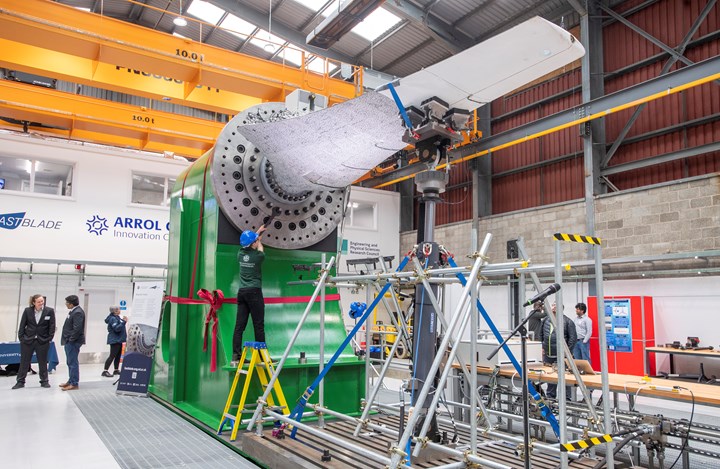FastBlade partnership leads to rapid composite tidal blade facility testing
The University of Edinbourgh and Babcock International have dedicated the facility to speeding up the process of designing more durable, efficient structures.
FastBlade, a partnership between the University of Edinburgh (Scotland) and engineering company Babcock International (London, U.K.), opened a £4.6 million facility rapid testing facility based in Rosyth, Fife, on May 13 for composite tidal turbine blades — which must withstand harsh ocean conditions for 20 years — to speed up the development of marine energy technologies while reducing significant energy costs.
FastBlade’s technology — said to be a world first — is supported by an £1.8 million grant from the UK Government, via the Engineering and Physical Sciences Research Council (EPSRC), part of UK Research and Innovation (UKRI). The 75-tonne reaction frame is capable of exerting powerful forces on turbine blades more than 50 feet long, the team contends. Tests on blades are carried out using a system of powerful hydraulic cylinders, which, in less than three months, can simulate the stresses placed on the structures during two decades at sea. The complex forces to which tidal turbines are exposed at sea are also replicated using digital and hydraulic technology systems developed by engineers at the University of Edinburgh.
Overall, by providing developers with better data on how tidal turbine blades deteriorate over time, the research team hopes to help optimize the design of more durable, efficient structures. FastBlade will also offer client businesses and engineering students and apprentices the chance to develop their digital and data skills in its state-of-the-art research center. The facility, funded by EPSRC and the University of Edinburgh, has received support from Edinburgh Innovations, the University’s commercialization service, throughout its development.
As well as tidal blades, FastBlade’s technology can also be used to test lightweight bridge sections and aircraft wing components. It is said to be the first facility to open in a recently launched multi-partner innovation center at Babcock’s Rosyth site. The Arrol Gibb Innovation Campus (AGIC) will work with companies in the marine, nuclear power and energy-transition sectors to transform large-scale manufacturing through innovation and skills development.
“FastBlade will be the world’s first dedicated fatigue test facility for tidal turbine blades, and will help this emerging industry provide clean, reliable renewable energy at a reasonable cost to consumers,” Professor Conchúr Ó Brádaigh, head of School of Engineering at the University of Edinburgh, emphasizes. “The facility will also help maintain the globally leading position of Scottish tidal turbine developers in the race to find sources of clean and secure power, as well as confirming the societal impact of the University of Edinburgh’s research and development efforts in marine renewable energy.”
Neil Young, engineering director for Babcock, adds that collaborations like this are fundamental to helping the wider engineering industry create more research opportunities and secure longer-term investment into digital and data skills, including generating real interest from students looking to learn more about sustainable technology. The test site will also aid in the U.K.’s net-zero ambitions.
Related Content
-
Alliance for European Flax-Linen and Hemp reports increasing flax fiber adoption in marine
The natural fiber is increasing traction across several marine applications, including in projects by Greenboats, Northern Light Composites, the Beneteau Group and others.
-
Orbital Composites installs robotic AM system at University of Rhode Island
The 12-axis Orbital S system designed to print continuous fiber-reinforced parts will be used to advance research in composites for underwater unmanned vehicles.
-
Composites end markets: Boatbuilding and marine (2025)
As 2023-2024 consumer demand slows, boat and marine vessel manufacturers continue to focus on decarbonization and new technologies using composites.
















